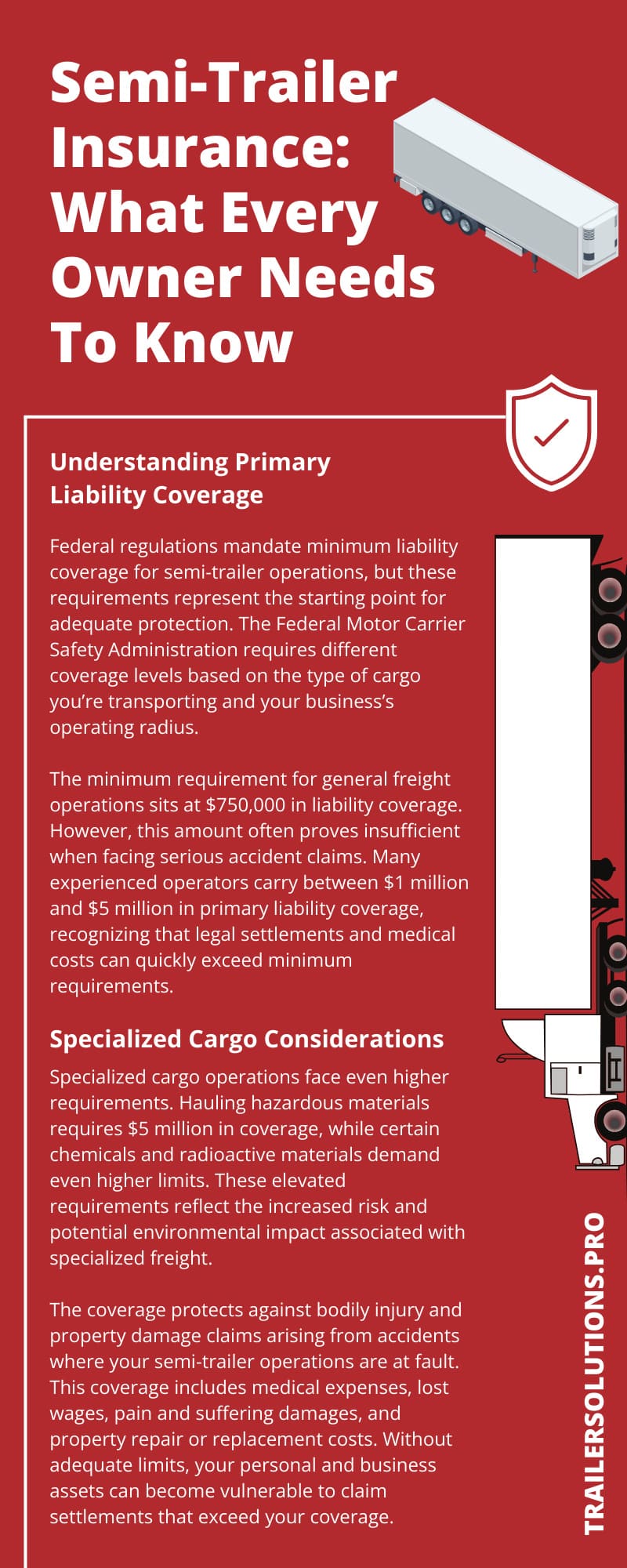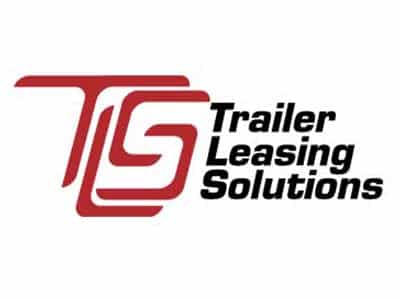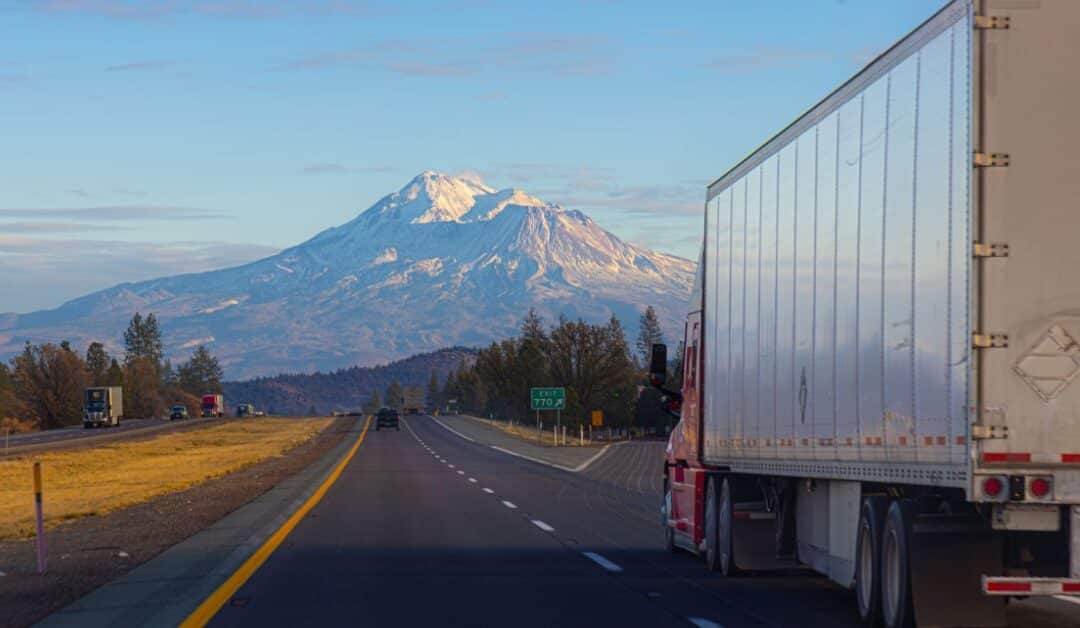Operating a semi-trailer comes with substantial financial responsibility. Beyond the initial purchase price and ongoing maintenance costs, protecting your investment through proper insurance coverage stands as one of your most critical business decisions. The complexity of commercial trucking operations means that inadequate coverage can lead to devastating financial consequences, while the right policy provides peace of mind and business continuity.
Understanding semi-trailer insurance and what every owner needs to know begins with recognizing that your coverage must extend beyond basic liability requirements. The trucking industry faces unique risks that standard commercial vehicle policies may not adequately address. Today’s semi-trailer owners must navigate an increasingly complex insurance landscape, from cargo damage to equipment breakdown, environmental cleanup to cyber liability.
Understanding Primary Liability Coverage
Federal regulations mandate minimum liability coverage for semi-trailer operations, but these requirements represent the starting point for adequate protection. The Federal Motor Carrier Safety Administration requires different coverage levels based on the type of cargo you’re transporting and your business’s operating radius.
The minimum requirement for general freight operations sits at $750,000 in liability coverage. However, this amount often proves insufficient when facing serious accident claims. Many experienced operators carry between $1 million and $5 million in primary liability coverage, recognizing that legal settlements and medical costs can quickly exceed minimum requirements.
Specialized Cargo Considerations
Specialized cargo operations face even higher requirements. Hauling hazardous materials requires $5 million in coverage, while certain chemicals and radioactive materials demand even higher limits. These elevated requirements reflect the increased risk and potential environmental impact associated with specialized freight.
The coverage protects against bodily injury and property damage claims arising from accidents where your semi-trailer operations are at fault. This coverage includes medical expenses, lost wages, pain and suffering damages, and property repair or replacement costs. Without adequate limits, your personal and business assets can become vulnerable to claim settlements that exceed your coverage.
Physical Damage Protection for Your Equipment
Your semi-trailer represents an enormous capital investment that requires protection against various forms of physical damage. Physical damage coverage typically divides into comprehensive and collision components, each addressing different risk scenarios.
Collision
Collision coverage handles damage resulting from accidents with other vehicles or objects. This coverage includes everything from minor fender-benders to total loss scenarios. Given the size and weight of semi-trailers, even minor accidents can result in substantial repair costs, making collision coverage essential for most operators.
Comprehensive
Comprehensive coverage addresses non-collision-related damage, including theft, vandalism, fire, hail, flood, and other environmental hazards. Semi-trailers face unique exposure to these risks due to their frequent parking in unsecured locations and extended exposure to weather conditions during long-haul operations.
Cargo Insurance Fundamentals
Protecting the freight you transport requires a separate cargo insurance coverage, as your liability policy typically excludes damage to cargo in your care, custody, and control. Cargo claims can arise from various scenarios, including accidents, theft, contamination, temperature fluctuations, and improper handling.
Temperature-sensitive cargo requires specialized coverage addressing refrigeration system failures and temperature excursions. On the other hand, electronics and high-value goods often need coverage for theft and mysterious disappearance. Lastly, liquid cargo operations face contamination risks that standard policies may exclude.
Understanding the interplay between shipping coverage and your policies prevents coverage disputes and ensures adequate protection for all parties involved in the transportation process.
Additional Coverage Considerations
Beyond the fundamental coverage types, semi-trailer owners should also evaluate several additional protections that address specific operational risks. These coverages can prevent minor issues from becoming major financial problems.
Equipment Failures
Equipment breakdown coverage addresses mechanical failures that some policies don’t cover in their collision or other documentation. Semi-trailers depend on complex systems including refrigeration units, lift gates, and specialized loading equipment. Breakdown coverage can handle repair costs and related expenses when these systems fail.
Environmental Coverage
Environmental liability coverage becomes crucial for operators handling chemicals, fuels, or other materials that could cause pollution. Cleanup costs and third-party damages from environmental incidents can reach enormous amounts, making this coverage essential for many operations.
Cyber Protection
Cyber liability protection addresses the growing threat of digital attacks on trucking operations. Electronic logging devices, fleet management systems, and customer data create new vulnerabilities that traditional policies don’t address. Cyber coverage becomes more important as the industry becomes increasingly digital.
Working With Insurance Professionals
The complexity of semi-trailer operations demands expertise in trucking operations and insurance coverage. Working with agents and brokers who specialize in commercial transportation ensures your coverage addresses your specific operations’ unique risks.
Specialized agents understand the nuances of different cargo types, operating territories, and regulatory requirements. They can also identify coverage gaps that general commercial agents might overlook and recommend solutions tailored to your business model.
The insurance marketplace for commercial trucking includes standard carriers and specialty insurers. Specialty insurers often provide more flexible terms and broader coverage options for unique operations, while standard airlines may offer more competitive pricing for conventional operations.
Trailer Leasing Solutions provides comprehensive and dependable storage trailer leasing services designed to support and protect your business operations. Whether you need additional storage space during peak seasons, a secure solution for inventory overflow, or a temporary option during facility renovations, our trailers are built to meet your needs. With a focus on reliability and flexibility, we help you stay on track to achieve your goals without disruption. Give us a call today!
Managing Costs While Maintaining Protection
Insurance costs represent an enormous operating expense for semi-trailer owners, but several strategies can manage premiums while maintaining adequate protection. The key lies in balancing cost savings with coverage adequacy.
Higher deductibles can greatly reduce premiums, but ensure you maintain sufficient cash reserves to handle deductible payments. Setting aside money equal to your deductibles creates a self-insurance fund that can smooth cash flow when claims occur.
Claims history can also greatly impact your insurance costs. Implementing comprehensive safety programs, conducting regular equipment maintenance, and providing ongoing driver training prevent claims and maintain favorable pricing. Even minor claims can affect your loss runs and future premiums.
Building Long-Term Insurance Partnerships
Successful semi-trailer operations require stable, long-term relationships with insurance providers who understand your business and support your growth objectives. Building these partnerships takes time but provides enormous benefits when challenges arise.
Consistent coverage with the same insurer establishes your credibility and can lead to more favorable terms over time. Understanding semi-trailer insurance and what every owner needs to know extends beyond simply meeting minimum requirements. Your insurance program should provide comprehensive protection that supports your business objectives while effectively managing risks.




